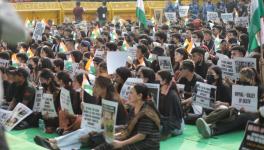‘Internationalising’ Higher Education: Foreign Faculty Appointments without Security Clearance

In a bid to save face from poor global rankings on internationalisation and global perception, the Indian government has set a plan in motion- to waive off all prior security clearances needed to recruit foreign faculty across higher education institutions in India.
The plan may help the Indian institutions in garnering international attention and funding, however, it runs the risk of putting on line the issue of eligible candidates that await permanent jobs in academia in India.
Speaking with NewsClick, Rajib Ray, President of the Delhi University Teachers’ Association (DUTA) said, “There is no dearth of Indian candidates seeking these positions. Of course, the rankings tick the funding box, however, the issue of making jobs permanent for Indian teachers must not be sidelined.”
Also Read: Death of the University, Indian Style!
Hoping to ease the tedious procedure for foreign academics, senior officials of the Ministry of External Affairs (MEA), Ministry of Home Affairs (MHA) and the Ministry of Human Resource Development (MHRD) in a meeting held on November 5 in Delhi, decided in the favour of direct recruitment of foreign faculty removing the previously mandatory prior clearance needed from the MHA and the MEA.
The officials specified that the Prior Reference Category countries (Pakistan, Afghanistan, Iraq, Sudan, foreigners of Pakistani origin, and stateless persons) and those who wish to visit restricted areas in India will continue to need prior approval. The new plan is set to cover in its ambit both public and private varsities.
The officials also stated that with the new rule book coming into effect soon- NRIs and Overseas Citizens of India (OCIs) too can be appointed as permanent faculty without having to seek prior clearance from MHA and MEA. It was also agreed that the foreign faculty recruited will be eligible to apply for long term visas which can be issued initially for a period of five years and can be extended further for another five years, effectively allowing a foreign faculty ten years in the job.
However, the MEA made it clear that political clearance for these appointments will still be mandatory, though the process will be shortened.
Also Read: Stooges Over Scholars: Sangh’s Latest Attacks on Academic Institutions
Modi government’s “internationalisation” plan also has something in store for those wanting to visit India for a short duration by relaxing visa procedures for participation of foreign faculty at seminars and conferences with a 3-4 day clearance mechanism in place and the e-Conference visa mechanism made available to 33 nations.
All of this may sound like a good step in the direction of uplifting India’s image but, this may come at the cost of prolonged suffering of those in the Indian academia who have been the victims of political apathy of the Modi government so far. While the problem of Ad hocs in the Indian university spaces are yet to be solved, with the new rules coming into effect shortly, some key questions like the pay scale of those recruited still remain unclear, added Ray.
Get the latest reports & analysis with people's perspective on Protests, movements & deep analytical videos, discussions of the current affairs in your Telegram app. Subscribe to NewsClick's Telegram channel & get Real-Time updates on stories, as they get published on our website.























